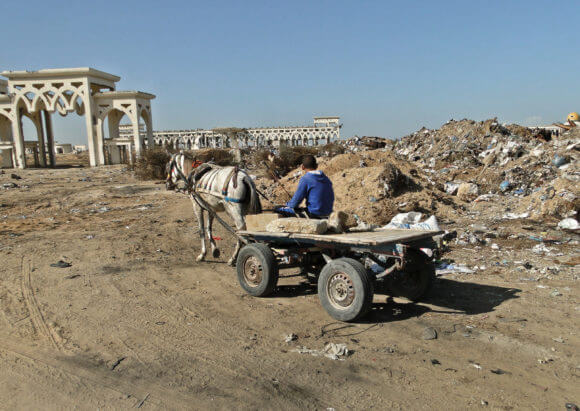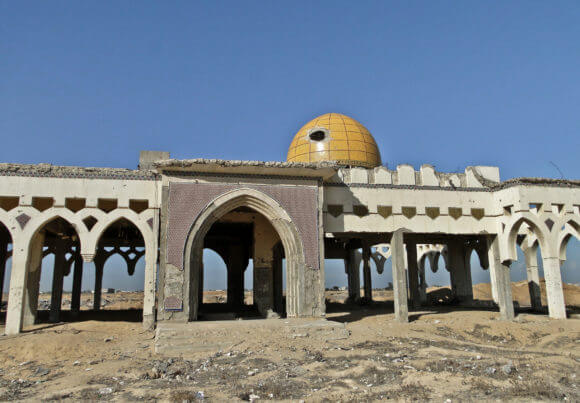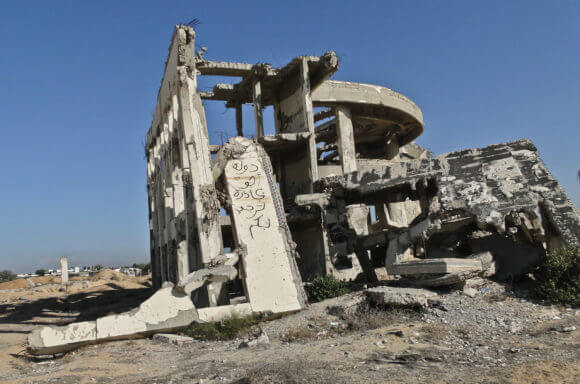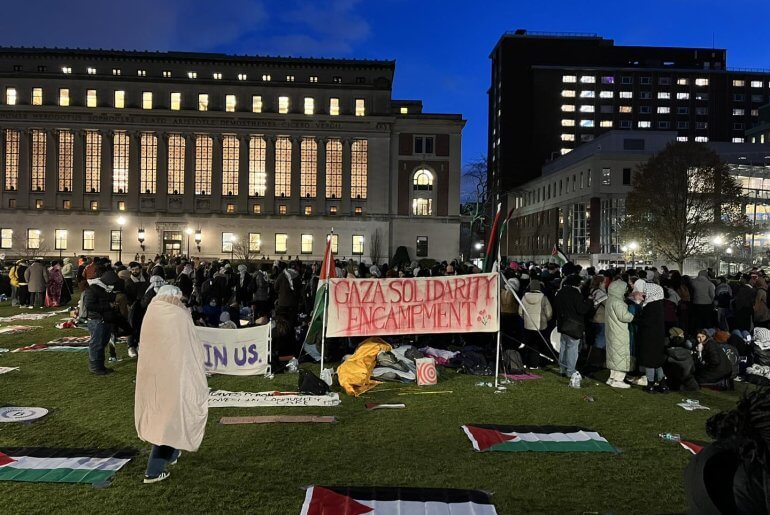At 8:50 a.m., I stopped a taxi in western Gaza City and asked the driver to go to the airport. The driver gazed at me as I sat next to him. He said: “Which airport? Do you mean the Cairo one?” I replied: “To the Gaza airport. Go to Rafah now, please.”
Muhsin al-Balawi, the 23-year-old driver, may have been right to be extremely perplexed over my query. He had never been an airplane passenger. He was born three years before the airport opened in 1998.
After 40 minutes of driving south on Salah al-Din Road, the main thoroughfare in the Strip, we hit the end of the asphalt road. Hundreds of yards further stood the departures terminal, which was surrounded by hills made of household waste.



Everything across this 690 acres stretch of semi-desert field was lifeless. A stench from a ripped apart donkey’s corpse filled the air. I was sure I will never visit this place after dark.
This arid zone was once the first airport for Palestinians in Gaza, a step towards a dream of independent state. In 2000, during the events of the Intifada, Israel bombed the control tower, then the runway, and finally the elegant Moroccan-inspired terminals. In 2001, Israeli army bulldozers flattened what remained.
Few dare to reach this area where dozens of large bomb craters pocket the landscape, due to the Israeli bombs. Maybe one or two scavenging the field can be found milling about each week. Arriving to this area is fraught with security concerns because of proximity to Israeli military bases, which are ready to fire on any suspicion of movement in the vicinity of the airport’s ruins.
Near a fallen concrete column, Abdullah al-Qarra, 29, was collecting some rusty iron bars from the ruins of the arrival hall to sell them in a local scrap market.
“Despite I was 11 at that time, but I felt a monumental event happened during the opening ceremony of the airport, but I really cried once I visited it after it destruction.” Abdullah said.
Abdullah, who once flew out of the airport with his father from Gaza to Riyadh when he was 14, recalls their three-hour trip. “But if I am lucky today, the same flight might take a whole day, due of the routine procedures at the Egyptian side of Rafah crossing including the trip to the Cairo airport, but this will happen only if the crossing is already open.”
Throughout 2017, the Rafah border crossing has opened for 20 days in total. Israel’s ongoing blockade, in full cooperation with Egypt, is about to enter its 11th year.
The Rafah crossing is the Gaza’s only gate to the world and was closed nine months ago. It has been reopened intermittently, as Cairo implemented a travel blockade since the summer of 2013.
Abdullah, who failed out of school in Cairo where he was studying management last year, says that Egyptian authorities impose a lot of restrictions on Gaza’s travelers. “Gaza’s passengers were forced to stop and held for several hours at military checkpoints in Sinai, before they proceeded to countless further checkpoints on their nearly 450 km trip to Cairo.”
“One time, the Egyptian military personnel at Raysa checkpoint seized my Samsung mobile phone and $200 USD, saying: ‘Oh, son of a bitch! give me that,'” Abdullah said. Raysa is a military checkpoint in el-Arish in the northern Sinai and is well-known to Gaza’s travelers who often cite waiting in long lines of cars for a very slow luggage inspection by the Egyptian army.
While talking to Abdullah, a horse-drawn cart passes in the area to collect used building blocks.
“I think this airport gave us a sense of freedom and independence because we could travel anywhere without Arab or Israeli humiliation. Patients with visas to enter Israel are turned back arbitrarily by Israeli officers at the Erez Crossing. Some are blackmailed, others are asked to work as spies,” Abdullah told Mondoweiss.
B’Tselem, an Israeli human rights organization, reported last December that the number of would-be patients being summoned for questioning at the Erez checkpoint spiked dramatically last year, with 601 medical permit applicants sent for interrogation in 2016, compared to 146 in 2015 and 179 in 2014.
Back by the defunct airport, I might have been able to ignore the smell of the donkey’s corpse, but before long the quiet was broken by the whirring of two Israeli F16s hovering overhead as well as a handful of drones scanning the area.


About 300 meters north of the departures terminal, I met Mohammed Salah, a 70-year-old retired public employee. He was accompanied by construction workers who are building his new house nearby.

He was once a passenger on a flight from Gaza to the beach town of Larnaca in Cyprus. “It was like an old bus with shaky wings. We felt some worry about the pilot, if he was really qualified,” he recalled.
The less than one hour flight was interesting, with a cabin crew serving coffee and biscuits in those brief moments between take off and landing. “In 1999, it was the first time I had flown on a Palestinian plane out of Gaza,” said Salah, “No one stops you in long queues as seen in Egyptian’s Rafah or at Erez.”
Salah said that airport was the beginning of a dream of a state of Palestine, “but it has been turned it into a helipad for ghosts,” he lamented.
I asked Salah what would force him to build in this semi-desert area.
“For Israel, shelling the concrete building of the airport means eliminating Palestinian existence, but building a house here proves the idea that the Palestinian man is able to live and rebuild again. The idea cannot die, but the stones are built and destroyed easily,” Salah told Mondowiess.
Aviation engineer Ahmed Al-Khairi, told me that the airport started up with one flight a week and increased up to four routes a day.
“On Saturdays, we had 16 roundtrip flights to Cairo, Amman, Riyadh, Dubai and Ankara. The Palestinians held their humanity and traveled without any restrictions at that time,” he said.



According to Al-Khairi, 20,000 passengers traveled through the Gaza airport in 1998, about 61,000 in 1999 and around 59,000 in 2000.
He added that during the bombardment, the crews collected what they could carry of the devices and move them out.
Before leaving the place, I tried to find to Abdullah, but he was gone. Perhaps he was satisfied with his collection of bars, or he was worried about those aircrafts.
Palestinians have an urgent need for an airport. We have suffered humiliation when trying to travel abroad for medical treatment, education and other humanitarian purposes, whether through the Rafah crossing, which is permanently closed except for only a few days, or Erez.
Ahmad Kabariti
Ahmad Kabariti is a freelance journalist based in Gaza.




Unless I am mistaken an Israeli pilot carved a star of David into the grounds of the airport during an Israeli tantrum .
The airport is more of a reflection of what happened to Israel. The Oslo process offered Israel a route to normality.
2 men decided to destroy it. They were both Askenazi leaders of Likud . Rabin was murdered after relentless incitement from a man who wanted Israelis to connect with their mental sewers. Today’s Israel is the fruit of his work. Fucked up Israel.
Netanyahu’s Israel.
Israelis singing “no school in Gaza. There are no children there ”
Bennett and Regev in government.
Sharon was the other nihilist.
“I’ve learned a lot this year.. I learned that things don’t always turn our the way you planned, or the way you think they should. And I’ve learned that there are things that go wrong that don’t always get fixed or get put back together the way they were before. I’ve learned that some broken things stay broken, and I’ve learned that you can get through bad times and keep looking for better ones, as long as you have people who love you.”
Jennifer Weiner, Good in Bed
Thinking people despise Israel
Thank you, M. Kabariti, for going to Gaza’s airport, to take these stark photos and to bring us this sad and lonely story. My heart weeps for the Palestinians.
“The Palestinians held their humanity and traveled without any restrictions at that time”.
I am not sure what is this deal about humanity, but it is true that they could travel without restrictions prior to 2000.
Then they started the war they call intifada.
The rest is commentary…
I could hear the dramatic complaint throughout the world if it had been the opposite that did happen: the sole Israeli airport bombed to ruins by Palestine.
One day, Israel will have to face the whole world, when the US of A and other NATO friends won’t anymore support zionist policies of land stealing, murder, lifetime imprisonment, war, bombing, use of chemical weapons, manipulation and control of world leaders and their countries, etc.